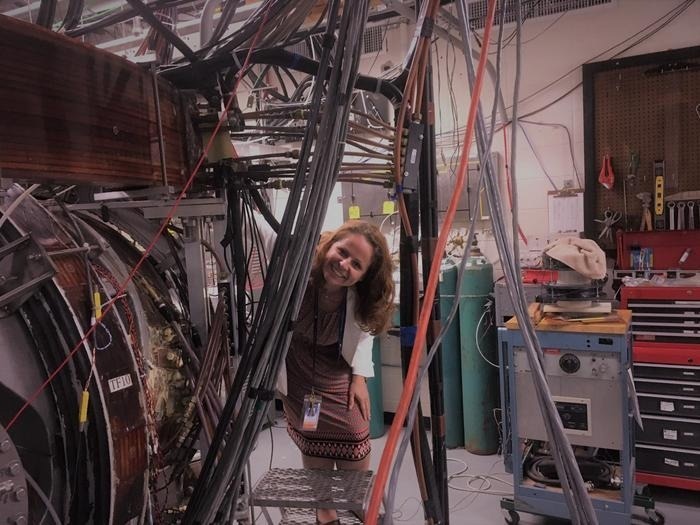Fusion is the process of fusing two light atomic nuclei to produce a single heavier one while emitting enormous quantities of energy. Fusion powers the Sun and all stars, making it the universe’s preferred way of creating energy. Recent fusion research achievements have resulted in the US government’s Bold Vision for Commercial Fusion Energy and the amazing expansion of the worldwide fusion industry.
 Dr Evdokiya Kostadinova standing by the Compact Toroidal Hybrid device at the Auburn University’s Physics Department. Image Credit: Dr David Maurer (CTH PI)
Dr Evdokiya Kostadinova standing by the Compact Toroidal Hybrid device at the Auburn University’s Physics Department. Image Credit: Dr David Maurer (CTH PI)
The US Department of Energy has awarded about $5 million in financing to a consortium of academics from MIT (as lead), Auburn University, William & Mary, the University of Wisconsin-Madison, and the HDF Group to speed the development of fusion-powered reactors on Earth.
The project will provide a framework for managing data from several fusion devices, including Auburn’s Compact Toroidal Hybrid (CTH), in accordance with Findable, Interoperable, Accessible, and Reusable (FAIR) standards and UNESCO's Open Science (OS) principles.
The data will also be modified so that it can be used with machine learning (ML) techniques. MDSplusML, an updated version of the MDSplus open-source software developed by MIT's Plasma Science and Fusion Center researchers in the 1980s to catalog the findings of the Alcator C-Mod’s experiments, will be used to build the platform’s databases.
MDSplus is now used by approximately 40 fusion research centers to store and allow external access to their fusion data. The release of MDSplusML will allow for the open interchange of data and models between universities, hastening progress in fusion research.
Dr. Evdokiya (Eva) Kostadinova, an Assistant Professor in the Physics Department specializing in multidisciplinary plasma research, leads the Auburn part of the project. Dr. David Maurer, an Associate Professor in the Physics Department and the head of CTH, will work alongside Kostadinova and her students.
Magnetic fields can be manipulated in various ways in Auburn’s CTH experiment to contain a heated plasma—the state of matter in which fusion events occur.
Researchers will be able to investigate various concepts for fusion reactors by open-sourcing CTH data and customizing it for use with ML techniques.
Fusion research has made remarkable progress, which is evident from multiple exciting results from experiments worldwide. However, true breakthroughs rely on strong collaborations committed to open science and a diversity of viewpoints. This project will enable such collaborations and will allow us to use machine learning to uncover fundamental science hidden in big datasets.
Dr. Evdokiya (Eva) Kostadinova, Assistant Professor, Auburn University
The initiative is a cross-institutional partnership involving four institutions and an industry partner, with a particular emphasis on workforce development. With four of the five principal investigators being women, the team intends to inspire and support diversity in the future generation of fusion scientists.
To make this a reality, the College of William and Mary will offer a summer school where undergraduate students will learn how to use ML approaches in fusion research each year of the initiative.
Having the opportunity to lead such an important project is extremely meaningful, and I feel a responsibility to show that women are leaders in STEM. We have an incredible team, strongly motivated to improve our fusion ecosystem and to contribute to making fusion energy a reality.
Dr. Cristina Rea, Research Scientist, Massachusetts Institute of Technology